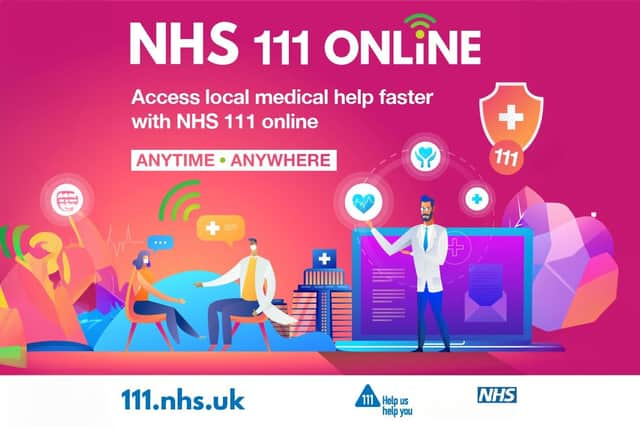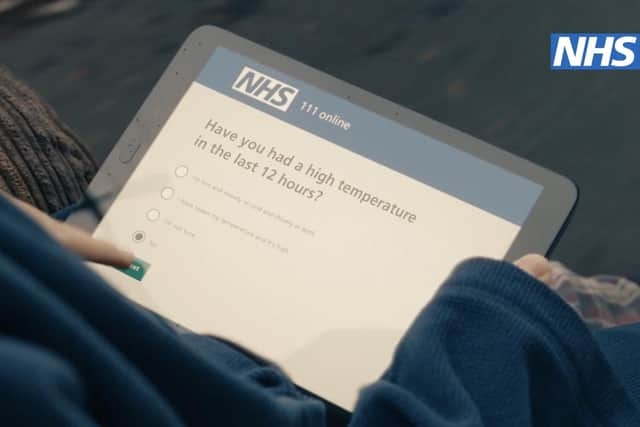NHS 111: Get the health help you need this winter
and live on Freeview channel 276
HOW TO CONACT NHS 111: Get help using NHS 111 by going online, visit 111 online, use the NHS App – download to your smartphone or tablet, via Google play or the App store – or call 111.
NHS 111 can assess and direct people to the most appropriate local service, including urgent treatment centres, GP practices, and consultations with a pharmacist.
And, if needed, it can arrange a call back from a nurse, doctor or paramedic.
Dr Nigel Wells, NHS Humber and North Yorkshire Integrated Care Board's (ICB) Executive Director of Clinical and Professional, said: "NHS 111 is an easy and convenient way to get urgent help for a wide range of health problems from the comfort of your own home.
"Using the NHS 111 service could save you a trip to A&E. It is estimated that up to two-fifths of A&E attendances are avoidable or could be better treated elsewhere.
"People should still call 999 or go to A&E in an emergency – when someone is seriously ill or injured and their life is at risk.
"But if you need urgent medical help and aren't sure where to go to get the help you need, use NHS 111."
The NHS 111 service is available 24 hours a day, seven days a week. You can call, go online or use the NHS App to get:
- the right healthcare in your area; or
- a call back from a nurse, doctor or paramedic; or
- advice on self-care


People should call 111 to speak to someone if they need to:
- discuss complex medical problems;
- discuss worries about a long-term condition; or
- get medical advice for a child under five


People who need help in another language can call 111 and ask for an interpreter, British Sign Language (BSL) users can contact 111 using the NHS 111 BSL interpreter service by visiting 111.nhs.uk, and text relay users can call 18001 111.
For more information, visit www.nhs.uk/111
Our top tips:
- Use NHS 111 for non-emergency medical advice. NHS 111 and the 111 online service are available 24/7. Trained medical professionals can provide guidance on the most appropriate medical care.
- Keep a well-stocked medicine cabinet at home. You can tackle many common winter illnesses and ailments without needing to visit a GP by maintaining a well-stocked medicine cabinet at home. Over-the-counter remedies like paracetamol, ibuprofen and anti-diarrhoea tablets can prove beneficial, as well as getting plenty of rest if you are unwell.
- Use local pharmacies. They are the go-to for minor health concerns. Pharmacy staff can provide clinical advice for minor health conditions common over the winter period such as coughs, colds, sore throats, tummy trouble and aches and pains. People can check with their local community pharmacy for specific opening hours using the NHS Find a Pharmacy service.


- Visit your local pharmacy if you run out of your prescription medicine. If you run out of medicine outside of your GP surgery's normal opening hours and need some urgently, there are a few ways to get an emergency supply quickly, even if you're away from home. There's more information about how pharmacies can help on the NHS website.
- Look out for yourself and others. The winter months can have an impact on mental health due to colder weather and shorter days. Even short bursts of exposure to sunlight can enhance mental well-being. Remember, older neighbours and relatives may be more vulnerable during winter and may require extra support. Regular check-ins and assistance can contribute to their overall wellbeing.
- Emergency situations. In cases of serious or life-threatening illnesses or injuries, patients should immediately call 999 for an ambulance or proceed to their nearest emergency department.
- Search local websites for support. If you're looking for information on common childhood illnesses, including advice on what 'red-flag' signs to look out for, where to seek help if required and how long your child's symptoms are likely to last, visit www.hnyhealthiertogether.nhs.uk. Alternatively, www.letsgetbetter.co.uk can help you 'choose well' if you're unsure where to go for help.
About Humber and North Yorkshire Health and Care Partnership
The Humber and North Yorkshire Health and Care Partnership is a collaboration of health and care organisations which brings together NHS organisations, local councils, health and care providers and voluntary, community and social enterprise (VCSE) organisations. It is committed to ensuring everyone living in in the area can live a happy, healthy life. Six geographical places make up Humber and North Yorkshire Health and Care Partnership: North Yorkshire, City of York, Hull, East Riding, North East Lincolnshire and North Lincolnshire.
About Humber and North Yorkshire Integrated Care Board
NHS Humber and North Yorkshire ICB is a statutory organisation accountable for NHS spend and performance for 1.7 million people across York, North Yorkshire, East Riding of Yorkshire, Hull, North Lincolnshire and North East Lincolnshire. The ICB is a core member of the Humber and North Yorkshire Health and Care Partnership, alongside NHS providers, local councils, health and care providers and voluntary, community and social enterprise (VCSE) organisations.